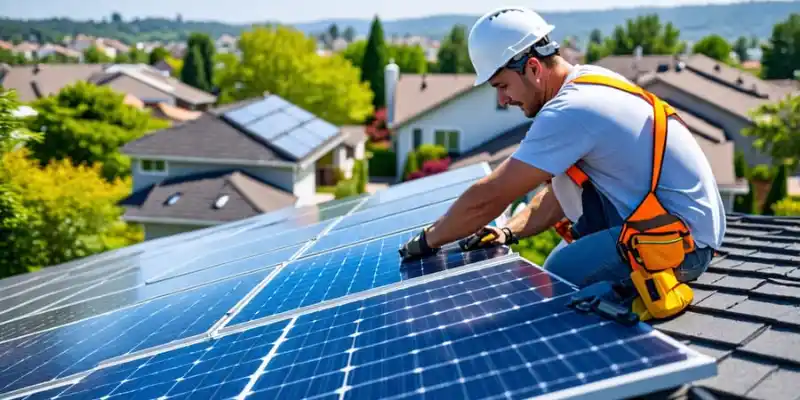Choosing the Best Solar Panel System for Your Home: A Complete Guide
Updated: 12 Nov 2024
166
Introduction to Choosing the Best Solar Panel System for Your Home
Switching to solar energy is an exciting step toward saving money and helping the environment. But with so many options, choosing the best solar panel system for your home can feel overwhelming. The right system depends on factors like your budget, energy needs, and available roof space. In this post, we’ll guide you through everything you need to know to pick the perfect solar panel system for your home. From panel types to installation tips, you’ll be ready to make a confident choice for a brighter, greener future.
What is “Choosing the Best Solar Panel System for Your Home”?

Choosing the best solar panel system for your home means finding the right setup that meets your energy needs, budget, and roof space. With so many types of solar panels and systems available, it’s important to consider factors like panel efficiency, system size, and overall costs.
A well-chosen solar system can help lower electricity bills, increase home value, and reduce environmental impact. By understanding your options, you can make a smart choice that brings you long-term savings and clean energy for years to come.
Why Choosing the Best Solar Panel System for Your Home Is Important
Making the right choice in a solar panel system has a lasting impact on your finances, energy independence, and environmental contribution. Here’s why it matters:
- Maximizes Energy Savings: Selecting the best system ensures you produce enough electricity to meet your home’s needs, which can significantly lower or even eliminate your monthly electricity bills.
- Increases Home Value: A high-quality solar panel system can boost your property value, making your home more appealing to future buyers.
- Enhances Energy Independence: By choosing the right system, you’re less reliant on traditional power sources and protected from rising electricity rates.
- Reduces Environmental Impact: Solar energy is clean and renewable. Choosing an efficient system reduces your carbon footprint, contributing to a healthier planet.
- Ensures Long-Term Reliability: A carefully chosen solar panel system with good-quality components requires less maintenance and has a longer lifespan, providing you with consistent energy for years.
Step-by-Step Guide on Choosing the Best Solar Panel System for Your Home

Step 1: Assess Your Energy Needs
- Look at your electricity bills to understand how much energy your home uses each month.
- Calculate your average energy consumption to determine the size of the solar system you’ll need to cover your energy needs.
Step 2: Evaluate Your Roof Space and Sunlight Exposure
- Check your roof’s available space and angle to see how many solar panels can fit.
- Consider how much sunlight your roof gets throughout the day; south-facing roofs with minimal shading are ideal.
Step 3: Understand the Types of Solar Panels Available
- Research the three main types: monocrystalline, polycrystalline, and thin-film solar panels.
- Choose the type that best fits your needs—monocrystalline panels are efficient, polycrystalline panels are budget-friendly, and thin-film panels are flexible.
Step 4: Compare Efficiency and Cost
- Review the efficiency ratings of different panels. Higher efficiency panels produce more energy but may cost more.
- Consider your budget and look for panels that provide the best balance between efficiency and cost.
Step 5: Explore Financing and Incentive Options
- Look into financing options like solar loans, leases, and power purchase agreements (PPAs) to help with upfront costs.
- Research any tax credits, rebates, or incentives available in your area to reduce the overall cost of installation.
Step 6: Choose a Reliable Installer
- Research local solar installers, read reviews, and ask for quotes.
- Choose a licensed, experienced installer who offers warranties on both the equipment and installation.
Step 7: Plan for Maintenance and Monitoring
- Understand the maintenance requirements for your chosen system; most solar panels require minimal upkeep.
- Consider adding a monitoring system to track your solar energy production and ensure everything is running efficiently.
| Advantages of Choosing the Best Solar Panel System for Your Home |
|---|
|
| Disadvantages of Choosing the Best Solar Panel System for Your Home |
|---|
|
Conclusion
Choosing the best solar panel system for your home can make a big difference in your energy savings and environmental impact. With the right system, you’ll lower your electricity bills, increase your home’s value, and enjoy clean, renewable energy for years to come. By considering factors like your energy needs, budget, and roof space, you can make a smart choice that benefits both you and the planet.
How do I know what size solar panel system I need?
To figure out the size, look at your electricity bills to see how much energy you use each month. Your installer can help calculate the right size based on your energy needs and available roof space.
What are the main types of solar panels?
The three main types are monocrystalline (high efficiency, more expensive), polycrystalline (cost-effective, medium efficiency), and thin-film (lightweight, flexible, but less efficient).
How much does a solar panel system cost?
The cost depends on the size of the system, the type of panels, and installation fees. You can explore financing options or check for rebates to help reduce the upfront cost.
How long do solar panels last?
Most solar panels last 25–30 years or more. They’re designed to be durable, with only minimal maintenance needed to keep them performing well.
Do solar panels work on cloudy days?
Yes, solar panels still produce some electricity on cloudy days, although less than on sunny days. A well-sized system can still meet your needs even with occasional clouds.
Bonus Points on Choosing the Best Solar Panel System for Your Home
- Tax Incentives and Rebates: Many areas offer tax credits, rebates, or incentives for installing solar panels, which can significantly reduce your upfront costs.
- Improved Battery Storage Options: Consider pairing your solar system with a battery to store excess energy. This can give you reliable power at night or during outages and increase your energy independence.
- Solar System Monitoring: Some systems come with monitoring apps that let you track energy production and usage in real time, helping you optimize your energy savings.
- Flexible Financing Options: From solar loans to power purchase agreements (PPAs), various financing options make solar more affordable and accessible than ever.
- Increased Resale Value: Homes with solar panel systems are often more attractive to buyers, as they come with long-term energy savings and eco-friendly benefits.
Please Write Your Comments